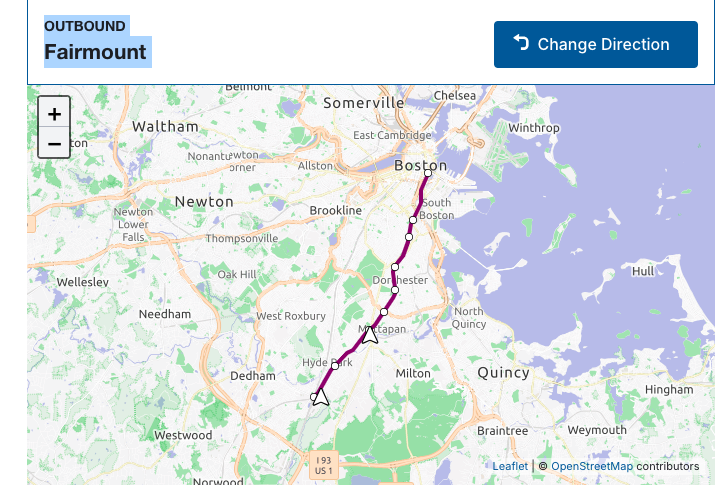The Massachusetts Bay Transportation Authority will electrify the 9 mile Fairmount Line, the shortest of their 12 commuter rail lines, using battery-electric multiple units. The first BEMU trains are projected to be operating in early 2028.

AASHTO Journal reported on Sept. 13 that the “Massachusetts Bay Transportation Authority – a division of Massachusetts Department of Transportation – recently signed off on a $54 million plan to introduce battery-electric multiple unit or BEMU trains to the Fairmount Commuter Rail Line. The first of those BEMU trains are scheduled to go into operation in early 2028.”
Keolis Commuter Services, the company that operates MBTA commuter rail lines, will begin the design and procurement process with the goal of delivering enough BEMU trains to operate 20-minute train service along the line.
Related:
- Boston Commuter Rail Recovering Rapidly, June 5, 2024
- Is it Fair to Blame Commuter Rail Woes on Private Operators? November 28, 2016
According to Wikipedia, the 9-station Fairmont line runs mainly “within Boston, running southwest from South Station through the neighborhoods of Dorchester, Mattapan and Hyde Park,” and “a short portion in Milton.”

“BEMU trains are powered by on-board batteries that are recharged by overhead catenary wires. Instead of locomotives pulling passenger cars, the batteries and motors will be integrated into four-car fixed sets,” adds AASHTO Journal.
An MBTA press release dated July 25 on the MBTA board's approval of the project indicates that catenary exists at South Station where the BEMUs would be recharged. Streetsblog Mass reported rather critically on the project in March, noting the agency's overall approach to electrification.
In fact, in spite of their electrification goals, the T has been ripping out miles of catenary wire that once powered fully-electric bus routes in Cambridge and Watertown.
It appears from the press release that Keolis will select the railcars.
With this agreement in place, Keolis will act as a Project Delivery Partner (“PDP”) to manage the new decarbonized fleet, additional power and charging infrastructure, and a new light maintenance facility.
Inquiries were made with both MBTA and Keolis – look for additional information in the comment section below this post if they respond after publication.
The MBTA commuter rail network is the nation's fifth busiest after New York's LIRR and Metro North lines, NJ Transit and Chicago's Metra.
Hat tip to AASHTO Journal weekly newsletter.
FULL STORY: MassDOT Taps Electric Trains for Commuter Rail Line

Planetizen Federal Action Tracker
A weekly monitor of how Trump’s orders and actions are impacting planners and planning in America.

Chicago’s Ghost Rails
Just beneath the surface of the modern city lie the remnants of its expansive early 20th-century streetcar system.

Amtrak Cutting Jobs, Funding to High-Speed Rail
The agency plans to cut 10 percent of its workforce and has confirmed it will not fund new high-speed rail projects.

Ohio Forces Data Centers to Prepay for Power
Utilities are calling on states to hold data center operators responsible for new energy demands to prevent leaving consumers on the hook for their bills.

MARTA CEO Steps Down Amid Citizenship Concerns
MARTA’s board announced Thursday that its chief, who is from Canada, is resigning due to questions about his immigration status.

Silicon Valley ‘Bike Superhighway’ Awarded $14M State Grant
A Caltrans grant brings the 10-mile Central Bikeway project connecting Santa Clara and East San Jose closer to fruition.
Urban Design for Planners 1: Software Tools
This six-course series explores essential urban design concepts using open source software and equips planners with the tools they need to participate fully in the urban design process.
Planning for Universal Design
Learn the tools for implementing Universal Design in planning regulations.
Caltrans
City of Fort Worth
Mpact (founded as Rail~Volution)
City of Camden Redevelopment Agency
City of Astoria
City of Portland
City of Laramie





























